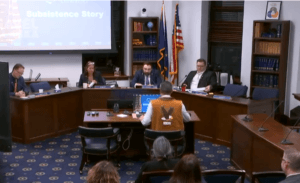 Brian Ridley, Tanana Chiefs Conference’s Chief, gave an important testimony at the January 31st House Tribal Affairs Special Committee. The meeting was the first for the 2024 legislative session, and centered around discussion of the importance of Alaska Native representation on state-level boards and commissions.
Brian Ridley, Tanana Chiefs Conference’s Chief, gave an important testimony at the January 31st House Tribal Affairs Special Committee. The meeting was the first for the 2024 legislative session, and centered around discussion of the importance of Alaska Native representation on state-level boards and commissions.
The committee meeting was attended by Representatives Ben Carpenter, Maxine Dibert, Thomas Baker, Sarah Vance, Rebecca Himschoot, Jamie Allard, and House Affairs Special Committee Chairman, Representative CJ McCormick. Ridley joined other stakeholder presenters, including Richard Peterson, President of Tlingit & Haida; Senior Director, Barbara “Waahlaal Giidaag” Blake and Executive Director, Karen Linnell, of the Alaska Native Policy Center, and Robin Samuelson, former CEO of Bristol Bay Economic Development Corporation and Former Member of the Alaska Board of Fish.
Ridley’s testimony focused on the salmon crisis and its parallel with the current lack of Native representation on the Board of Fish and Board of Game, as well as the lack of Government dollars allocated towards the Subsistence section of the state’s fish budget. “By these numbers, subsistence is less of a priority, and more of an afterthought for the State of Alaska,” Ridley declared.
In recent years, the State of Alaska has allocated $6 million to the subsistence fishing and hunting portion of the overall fish budget, which accounts for just 4.56% of the overall budget. Even more concerning is that the subsistence fish distribution has amounted to less than 1% of the overall state haul. It comes in at under 20 lbs for urban households. In rural households – where, according to an Alaska Department of Fish and Game survey, harvested meat accounts for 100% of residents’ daily protein intake – the distribution averaged 275 lbs per household. By contrast, commercial fishing operations pulled 98.6 % of the overall harvest of fish from Alaskan waters in recent years.
“I’m here to tell you that what’s good for Alaska Natives is good for Alaska,” Ridley said about the need for Indigenous knowledge to hold a place on State boards of Fish and Game.
“We are at the front of the lines, fighting for wild resources for our state. We’re taking our battles inside the courthouses to ensure that all of our children will have access to salmon, crab, halibut, moose, and caribou.”
Ridley ended his presentation with a reminder to the Tribal Affairs Committee that the Board of Fish is currently drafting incorporations of traditional ecological knowledge (TEK) into their processes. “The only way to ensure the adequate inclusion of Indigenous knowledge in the Board of Fish and Board of Game decision-making processes is to adequately have the Alaska Native perspective represented on these boards,” he concluded.
If you want to learn more about what you can do to represent our crucial perspective in spaces like Board of Fish and Board of Game, check out our Take Action for Fish www.tananachiefs.org/get-involved/
